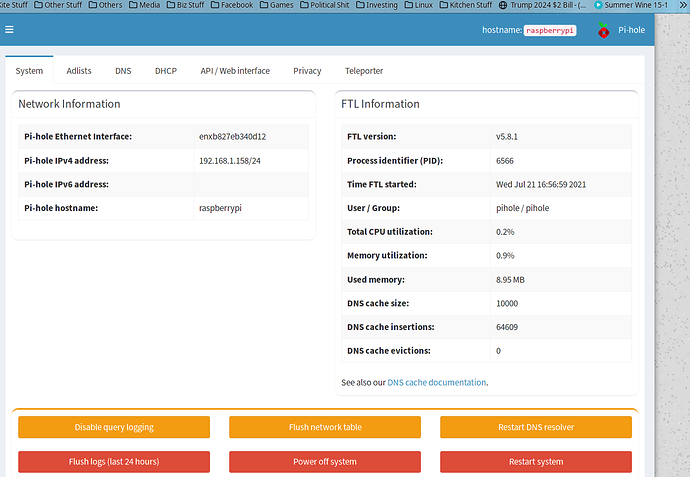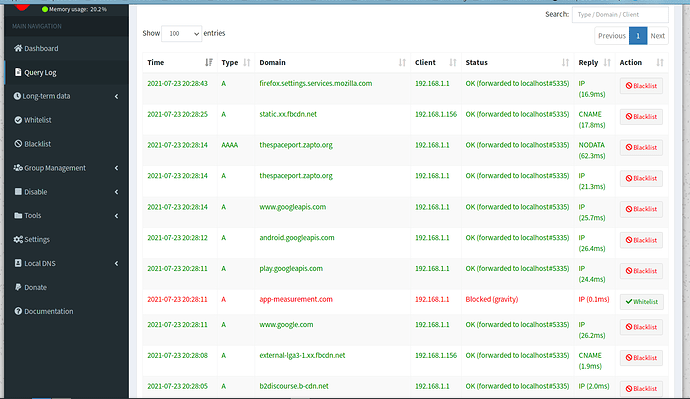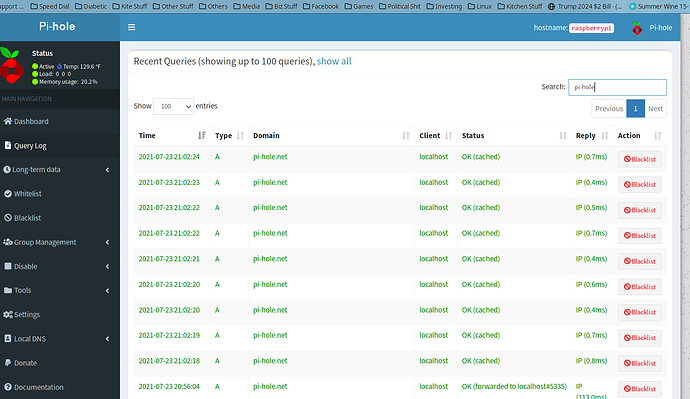ok, got the screenie for FTL - looking for cache population?
Can you run a few dig or nslookup runs against a single domain and see what is shown for response times and for the web page log?
It's quite possible that the domains you are looking at have very low TTL values and are in the cache for short periods of time. (5 seconds or less for some major sites)
You can try dig pi-hole.net a few times and see if the query response times drop on the additional runs, and then check the web interface to see if the additional ones are coming from cache.
I can run dig on the pi after ssh into it, but oddly, manjaro has no dig or nslookup commands available.
on the r-pi dig shows:
; <<>> DiG 9.11.5-P4-5.1+deb10u5-Raspbian <<>> pi-hole.net
;; global options: +cmd
;; Got answer:
;; ->>HEADER<<- opcode: QUERY, status: NOERROR, id: 35588
;; flags: qr rd ra; QUERY: 1, ANSWER: 1, AUTHORITY: 0, ADDITIONAL: 1
;; OPT PSEUDOSECTION:
; EDNS: version: 0, flags:; udp: 1232
;; QUESTION SECTION:
;pi-hole.net. IN A
;; ANSWER SECTION:
pi-hole.net. 757 IN A 178.128.134.214
;; Query time: 16 msec
;; SERVER: 1.1.1.1#53(1.1.1.1)
;; WHEN: Fri Jul 23 11:57:07 EDT 2021
;; MSG SIZE rcvd: 56
I have to run out for work for a bit - TY VERY MUCH for the help - I should be back in a couple of hours!

That's not querying Pi-hole, that's going to your upstream.
If that's the Pi-hole server itself then you can directly query with
dig pi-hole.net @127.0.0.1 or dig pi-hole.net @<PI-HOLE IP>
You need to run it a few times though, the first time it probably will go to unbound and you'll see a query time in maybe 10-100ms. Run dig again and it should show a query time of 1ms or 0ms and that shows it's pulling from cache. Run dig a third time to see even more of this.
After you've done that then check the web interface to see where the queries went, it should just confirm what we've already found out.
A request only shows as cached if at the time of the request, the domain was in cache. Cache entries are typically for 5 minutes or less (the duration of most TTLs). If you have a new request more than the number of seconds specified by the TTL later than the first, the second request won't be in cache and it will be forwarded to the upstream DNS server for resolution. In this case, Pi-hole forwarded it to your local instance of unbound, as expected.
so, I ssh'ed into the pi - after about 15 or 16 repeats of the dig command,I get this;
$ dig pi-hole.net
; <<>> DiG 9.11.5-P4-5.1+deb10u5-Raspbian <<>> pi-hole.net
;; global options: +cmd
;; Got answer:
;; ->>HEADER<<- opcode: QUERY, status: NOERROR, id: 15669
;; flags: qr rd ra; QUERY: 1, ANSWER: 1, AUTHORITY: 0, ADDITIONAL: 1
;; OPT PSEUDOSECTION:
; EDNS: version: 0, flags:; udp: 1232
;; QUESTION SECTION:
;pi-hole.net. IN A
;; ANSWER SECTION:
pi-hole.net. 728 IN A 178.128.134.214
;; Query time: 17 msec
;; SERVER: 1.1.1.1#53(1.1.1.1)
;; WHEN: Fri Jul 23 17:43:06 EDT 2021
;; MSG SIZE rcvd: 56
That's not using Pi-hole, that's using your upstream 1.1.1.1
ok - it just seems strange though - before I redid pihole, IIRR almost ALL the requests showed 'cached'...
I thought the reason to use unbound was to keep DNS cache, to speed up subsequent lookups, or am I mistaken?
so, where have I gone wrong?
ok, so, after getting my head out of my nethers - I redid the dig command, as you showed (and I somehow managed to ignore)....this was after run number 6
$ dig pi-hole.net @127.0.0.1
; <<>> DiG 9.11.5-P4-5.1+deb10u5-Raspbian <<>> pi-hole.net (at)127.0.0.1
;; global options: +cmd
;; Got answer:
;; ->>HEADER<<- opcode: QUERY, status: NOERROR, id: 27785
;; flags: qr rd ra; QUERY: 1, ANSWER: 1, AUTHORITY: 0, ADDITIONAL: 1
;; OPT PSEUDOSECTION:
; EDNS: version: 0, flags:; udp: 4096
;; QUESTION SECTION:
;pi-hole.net. IN A
;; ANSWER SECTION:
pi-hole.net. 840 IN A 178.128.134.214
;; Query time: 1 msec
;; SERVER: 127.0.0.1#53(127.0.0.1)
;; WHEN: Fri Jul 23 17:54:58 EDT 2021
;; MSG SIZE rcvd: 56
Okay, that's from cache.
The TTL for the A record for pi-hole.net (per this website, for reference) is 900 seconds (15 minutes). Depending on which upstream DNS server you use, it may be less than that in your reply from the upstream nameserver.
https://dnsviz.net/d/pi-hole.net/dnssec/
If I dig this domain from Cloudflare, I get a TTL of less than 900 seconds. Subsequent digs to Cloudflare show widely different TTLs.
dig pi-hole.net @1.1.1.1
;; ANSWER SECTION:
pi-hole.net. 59 IN A 178.128.134.214
;; Query time: 23 msec
;; SERVER: 1.1.1.1#53(1.1.1.1)
Same dig to Quad 9 gets the full TTL:
dig pi-hole.net @9.9.9.9
; <<>> DiG 9.11.5-P4-5.1+deb10u5-Raspbian <<>> pi-hole.net @9.9.9.9
;; ANSWER SECTION:
pi-hole.net. 900 IN A 178.128.134.214
;; Query time: 69 msec
;; SERVER: 9.9.9.9#53(9.9.9.9)
so, this set of status and replies are normal then?
I could have sworn the previous install showed a LOT more status with 'cached' in it...
In the search box, type "Pi-hole.net" after you do some of the digs showing the 1ms/0ms responses.
ok, here is the result...
I'm beginning to wonder (and TY Dan for ALL the help thus far!) if perhaps I may have presented my issue correctly - the ultimate goal is to make sure I've set this up correctly, so that unbound is running as a recursive DNS...
I will apologize, if I'm making you tear out your hair with this... 
this does look a LOT better though...
That set of status and replies appears completely normal, given that screen alone. If these are all first queries, you would expect them to not be served from cache.
Run these commands in the order and timing given, and post the results:
sudo service unbound restart
pihole restartdns
dig pi-hole.net @192.168.1.158
wait 5 seconds
dig pi-hole.net @192.168.1.158
grep pi-hole.net /var/log/pihole.log | tail -n20
If the first dig command produces a reply, then unbound is working properly, since the domain should not be in the Pi-hole cache or the unbound cache after the restarts.
The second dig should be served from cache, since the domain TTL is greater than 5 seconds.
The log output will show the two subsequent digs for the domain.



